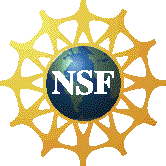
 |
|
|
|
|
|
|
|
|
Printable Brochure (Note:
deadlines in the brochure
and restrictions to freshmen and sophomores no longer apply)
Application for incoming freshmen (Please
print out the form first and then fill it in.)
USF Admissions About the scholarship organizers Contact Info
Prof. David Rabson
Webmasters |
USF-NSF COMPUTATIONAL-SCIENCE SCHOLARSHIP PROGRAMThe scholarship was funded from fall 2007 through spring 2011. This page remains up for archival purposes only. Thank you for your interest.Welcome to the USF-NSF Computational-Science Scholarships webpage. The University of South Florida has received a grant from the National Science Foundation to provide scholarships to undergraduates interested in pursuing degrees in the fast-growing interdisciplinary field of computational science. Computational science combines the use of state-of-the-art computers with one or more conventional disciplines, such as statistics, chemistry, or physics, to answer scientific questions. Modern, high-performance computers can perform billions of operations in a second, allowing computational scientists to explore real-world problems that could never be solved with pen and paper. Graduates with experience in both computation and a scientific discipline are in great demand in almost any technical field, whether in academia or industry, including such diverse areas as materials science, synthetic organic and medicinal chemistry, biochemistry, environmental science, space physics, defense systems engineering, weather prediction, financial market simulations, to name just a few. Scholarships will be awarded for up to $10,000 per year for up to four years (starting fall 2007) in addition to other sources of financial aid. The level awarded depends on unmet need; for an incoming freshman, it could be as much as $40,000 over four years (spring 2011 is the last semester of the scholarship, so for new applicants, the scholarship may be worth up to $5,000). You may qualify for the USF-NSF Computational-Science Scholarship if you are majoring in physics, chemistry or statistics and if you satisfy the following additional eligibility criteria:
In addition to scholarship funds USF will also provide academic support to give you every opportunity to succeed in your chosen field. This support will include
Please follow the links at left/top to learn more about this program and how to apply. We anticipate several slots opening for spring 2010. Awards will be made on a rolling basis, meaning that applications received after the money has been used up will not be considered. PLEASE APPLY AS QUICKLY AS POSSIBLE. |
|

|
||
|
Partial support for this work was provided by the National Science Foundation Scholarships in Science, Technology, Engineering, and Mathematics (S-STEM) program under award No. 0631023. Any opinions, findings, and conclusions or recommendations expressed in this this material are those of the author(s) and do not necessarily reflect the views of the National Science Foundation. |
||